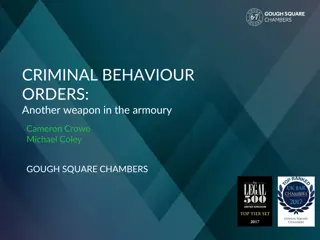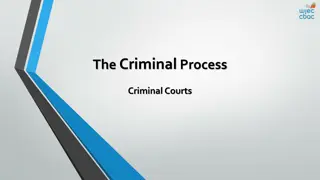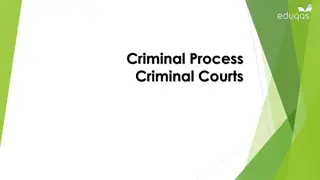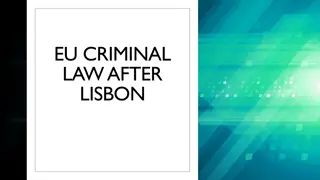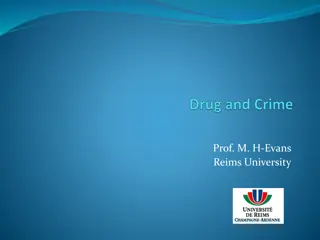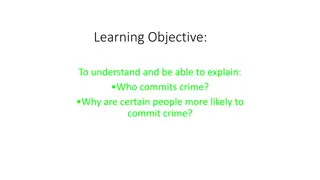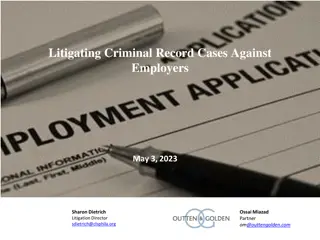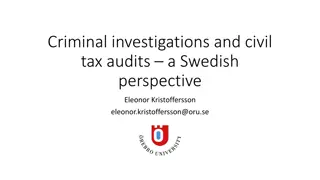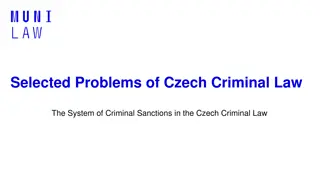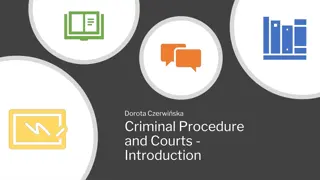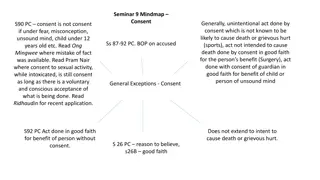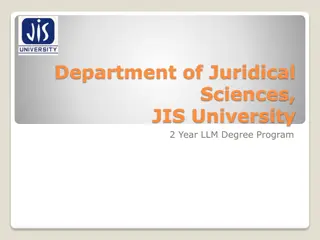AQA Law A Level at City of Norwich School
Explore the comprehensive AQA Law A Level curriculum offered at City of Norwich School, covering topics such as the nature of law, criminal law, tort law, and human rights. Students will delve into the English legal system, learn about various legal principles and rules, study criminal liability and
1 views • 8 slides
Overview of EU Criminal Law: Classes, Exam, and Directives
This content provides detailed information on substantive and procedural aspects of EU Criminal Law, covering classes, terms of participation, exam details, and specific directives. It includes guidelines on passing the classes through active participation, presentations, and exams. The schedule out
3 views • 13 slides
United Nations Survey on Crime Trends and Operations of Criminal Justice Systems
The United Nations Survey on Crime Trends and Operations of Criminal Justice Systems (UN-CTS) focuses on harmonizing data collection, identifying crime patterns, improving monitoring of the criminal justice system, and enhancing international comparability of crime statistics. It was mandated by the
3 views • 18 slides
AI in Canadian Criminal Law: A Lifecycle Analysis
The Law Commission of Ontario (LCO) is at the forefront of assessing the impacts of AI on civil administrative and criminal law. While Canada has been slower in adopting AI tools compared to other jurisdictions, concerns such as access to justice, due process, and Charter rights are being raised. Th
1 views • 19 slides
Harmonisation of Substantive Criminal Law in the EU
The Treaty of Lisbon serves as a legal foundation for the harmonisation of substantive criminal law within the European Union. It establishes the basis for judicial cooperation, mutual recognition of judgments, and approximation of laws across Member States. The treaty allows for the establishment o
2 views • 60 slides
International Law of War: Nuremberg Principles and Accountability
The Nuremberg Principles, derived from the trials of Nazi officials for war crimes, establish accountability in international law. These principles hold individuals responsible for committing acts considered crimes under international law, regardless of their position or orders received. The assumpt
2 views • 22 slides
Understanding Criminal Behavior from a Social Psychological Perspective
This unit delves into the application of social psychology in the legal system, exploring the nature of criminal behavior, responses to criminal acts, the criminal justice system, and rehabilitation. It examines the social ecological perspective of criminal acts and outlines key points related to th
0 views • 50 slides
Understanding Psychological Theories of Criminal Behavior
Psychologically-based criminologists attribute criminal behavior to individual factors such as negative early childhood experiences and inadequate socialization, leading to criminal thinking patterns and incomplete cognitive development. Probation and parole practices are influenced by rehabilitatio
0 views • 30 slides
Understanding Criminal Law and Procedure: Greenvisor's Case
A case study involving embezzlement by Joe Greenvisor, the chief accountant of Nobreath Corporation, sheds light on criminal acts, duties, intent, and societal perspectives on crime. Despite Greenvisor's charitable intentions, his actions constituted a crime under the law. The elements of criminal a
0 views • 47 slides
Understanding Criminal Offences: A Comparative Analysis
Exploring the concept of criminal offences, this article delves into the definitions in common law and continental law systems. It discusses the structural elements, harmful nature, prohibition, punishment, and distinctive aspects of criminal acts. A comparison between common law and continental law
1 views • 33 slides
Understanding the Process of Sealing Criminal Records
Having a criminal record sealed means making it inaccessible to the public while keeping it available to criminal justice agencies. Eligibility for sealing records requires taking action, and not everyone qualifies. This clinic provides guidance on the sealing process and the types of records that c
0 views • 36 slides
Understanding the Roles in Criminal Justice System
The criminal justice system involves three branches of government, each with specific responsibilities, operating at federal, state, and local levels. Law enforcement is primarily a local government function, while legislatures determine criminal laws and punishments. Statutes organized into codes d
0 views • 35 slides
Understanding Criminal Law: Final Exam Prep Tips
Explore the format of the CRW1501 final examination, learn how to tackle question 1 effectively, and get insights into criminal law concepts. Familiarize yourself with sources of law, legislation, and key aspects to excel in your studies. Enhance your understanding of criminal law through practical
0 views • 67 slides
Understanding Substantive Criminal Law in the American Legal System
Substantive criminal law encompasses the definition of criminal acts and penalties, with a core principle being that there can be no crime without a corresponding law. The American legal system follows the Rule of Law, ensuring that all individuals are subject to legal governance. Constitutional lim
0 views • 22 slides
Confiscation in the Criminal Courts: A Guide to Proceeds of Crime Law
Confiscation in the criminal courts involves depriving defendants of benefits gained from criminal conduct within their means. The Proceeds of Crime Law in the Cayman Islands sets guidelines for these proceedings, emphasizing that confiscation is not a form of punishment but aims to recover obtained
3 views • 17 slides
Understanding the Process of Sealing Criminal Records
Sealing criminal records means restricting public access to the records, although they are not destroyed and remain accessible to certain entities. Eligibility requirements vary, and action must be taken to seal records. This presentation covers the process, eligibility criteria, and what to expect
1 views • 36 slides
Understanding Civil and Criminal Complaints in Legal Cases
Explore the distinctions between civil and criminal complaints in legal scenarios. Learn how a civil case seeks monetary damages while a criminal case pursues punishment for wrongful actions. Understand the roles of plaintiffs and prosecutors, burden of proof, and outcomes in both civil and criminal
0 views • 34 slides
Briefing on the Criminal Procedure Amendment Bill [B12-2021] to the Portfolio Committee on Justice and Correctional Services
The Criminal Procedure Amendment Bill aims to address the constitutional invalidity of section 154(3) of the Criminal Procedure Act by enhancing protection for child victims, accused, and witnesses in criminal proceedings. The Bill proposes prohibiting the publication of information revealing their
0 views • 12 slides
Understanding Criminal Behaviour Orders: An Overview and Legal Requirements
Criminal Behaviour Orders (CBOs) are issued following conviction for criminal offences to tackle serious and persistent anti-social behavior. This talk provides an overview of CBOs, legal requirements, when they are appropriate, and practical tips for implementation. The orders can prohibit or requi
0 views • 12 slides
Understanding General Criminal Law: Principles and Relationships
General Criminal Law encompasses rules governing offenses and their penalties, exploring the definitions of offenses, relationships with social sciences, other branches of law, and auxiliary sciences. This presentation covers the importance, sources, and branches of criminal law, highlighting its in
1 views • 230 slides
Overview of UK Law: Statute Law, Common Law, Criminal Law, Civil Law
Statute Law is written law created through the parliamentary process, forming the basis of the legal system. Common Law, on the other hand, is unwritten law based on judicial decisions and precedents. They govern different aspects such as civil and criminal matters, each with its unique characterist
0 views • 15 slides
Asset Recovery Practices in England and Wales: Criminal vs. Civil Proceedings
Asset recovery in England and Wales involves a combination of criminal and civil proceedings to secure justice and return funds to victims of crime. The CPS's Proceeds of Crime Division plays a crucial role in obtaining Restraint Orders and Confiscation Orders. Civil recovery, focusing on illicit fi
0 views • 11 slides
Understanding the Criminal Justice System in Court Proceedings
This content explores various aspects of the criminal justice system, including the adversarial system, classification of offenses, criminal court systems, trial procedures, plea bargaining, and more. It covers models of criminal justice systems, classification of offenses, modes of trial, sending f
0 views • 15 slides
Overview of the Criminal Justice System
Exploring the complexities of the criminal justice system, this content delves into the adversarial system, classification of offenses, criminal court system, modes of trial, plea bargaining, trial procedures, and various criminal process models.
0 views • 15 slides
Overview of EU Criminal Law Changes After Lisbon Treaty
The Lisbon Treaty signed in 2007 brought significant changes to EU criminal law, moving cooperation from the EU Treaty to the Treaty on the Functioning of the EU. It abolished the pillar structure, expanded the CJEU's competences in criminal law, and emphasized the area of freedom, security, and jus
0 views • 28 slides
The Statistical Association Between Substance Misuse and Criminal Behavior
This brief synthesis discusses the statistical association between substance misuse (specifically drugs and alcohol) and criminal behavior. It draws upon meta-analyses investigating the links between drug use and crime, as well as alcohol consumption and violent behavior. Various theories are explor
0 views • 12 slides
Evolution of Criminal Law and Thought: From Pre-Classical Era to Enlightenment
Explore the progression of criminal law and thought from the Pre-Classical School of Thought to the Enlightenment era. Delve into concepts like folkways, mores, and the origins of criminal law, including examples such as societal norms, dress codes, and supernatural explanations for behaviors during
0 views • 23 slides
Exploring the Factors Behind Criminal Behavior
Understanding who commits crime and why certain individuals are more likely to engage in criminal activities involves exploring a range of social and biological factors. While biology suggests a genetic predisposition to criminal behavior, sociology emphasizes the influence of social factors like fa
0 views • 9 slides
Understanding Title VII and Criminal Records in Employment Discrimination Cases
This presentation delves into the intersection of Title VII and criminal records in employment discrimination cases. It covers the lack of specific protections for individuals with criminal records under Title VII, the implications of disparate impact cases, and the development of standards in the c
0 views • 15 slides
Asset Recovery: The Irish Approach towards Criminality
The paper discusses the emergence and structure of the Criminal Assets Bureau (CAB) in Ireland, highlighting the shift in approach towards dealing with criminal activities and the focus on targeting the proceeds of crime. It explores the operational positions and approaches adopted by CAB, emphasizi
0 views • 7 slides
Evolution of EU Criminal Law Through Cooperation and Commitment
The history of EU criminal law traces back to the Treaty of Rome in 1957 when the EU initially focused on economic matters. Over the years, with the judgment in the Stauder case in 1969 and the formation of the TREVI group in the 1970s, cooperation on security and combating terrorism laid the founda
0 views • 59 slides
Classification of Law: Understanding Different Types and Functions
Exploring the classification of law is essential for understanding the diverse nature of legal systems. This overview delves into domestic law vs. public international law, public law vs. private law, and the sub-divisions within public law, such as constitutional, administrative, and criminal law.
0 views • 19 slides
Exploring Criminal Law Basics
Delve into the fundamentals of criminal law through topics such as the definition of crime, the elements of a crime, why we have criminal law, and real-life scenarios to understand legal concepts. Discover the significance of criminal law in maintaining safety, encouraging good behavior, and promoti
0 views • 27 slides
Understanding the Interaction Between Criminal Investigations and Civil Tax Audits in Sweden
The relationship between criminal investigations and civil tax audits in Sweden is explored, highlighting how tax audits and criminal proceedings run concurrently. The mens rea requirement for criminal sanctions and tax surcharge, as well as the integration between criminal sanctions and tax surchar
0 views • 13 slides
Overview of Criminal Sanctions in Czech Law
The Czech criminal law system is discussed, covering topics such as the philosophy of criminal sanctions, goals of punishment, fundamental principles, and the system of sanctions and punishments. Key aspects include the classical school retributivism, prevention strategies, and principles guiding se
0 views • 33 slides
Overview of Legal Systems and Roman Law Development
Legal systems play a crucial role in governing societies, with Roman Law, Common Law, Civil Law, and Religious Law being some of the major types worldwide. Roman Law, focusing on private law, has influenced legal traditions in various regions, especially in Europe. Contrasting Common Law and Civil L
0 views • 26 slides
Fundamentals of Criminal Law and Procedure
Explore the key aspects of criminal law and procedure, including definitions of crime, the role of criminal procedure, sources of law, phases of the criminal process, participants involved, and rules of evidence in legal proceedings. Gain insight into how criminal law is distinct from civil law and
0 views • 24 slides
Understanding Self-Defence Law: Necessity and Statutory Defences
Self-defence is a crucial aspect of criminal law, encompassing actions taken to protect oneself or others from harm. This includes both common law defences and statutory provisions such as those outlined in the Criminal Law Act 1967. The law allows individuals to use reasonable force in circumstance
0 views • 11 slides
Legal Principles of Consent and Mistake in Criminal Law
In criminal law, consent plays a crucial role in determining liability for acts done with or without intention. The seminar mind map explores the concepts of consent, accidents, mistakes, and necessity in legal contexts, outlining the key principles, exceptions, and application in different scenario
0 views • 4 slides
2-Year LLM Degree Program in Juridical Sciences at JIS University
Explore the 2-year LLM degree program offered by the Department of Juridical Sciences at JIS University, specializing in Corporate Law, Criminal Law, and Constitutional Law. The program covers a range of specializations such as Comparative Criminal Law, Human Rights, Corporate Law, Competition Law,
0 views • 7 slides



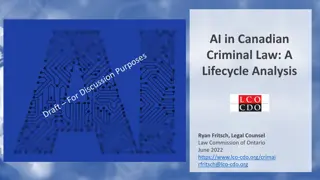




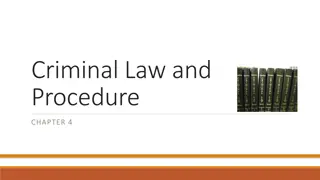


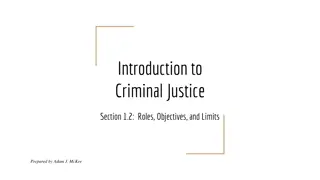
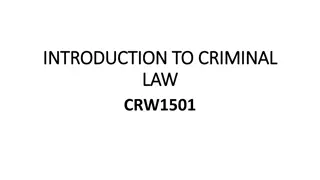
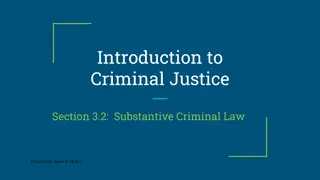
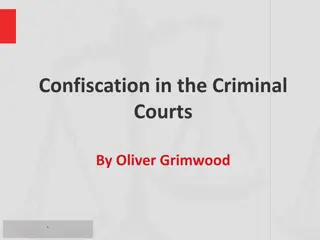

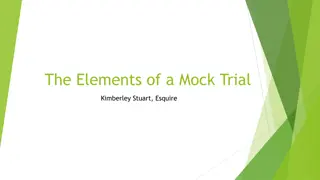
![Briefing on the Criminal Procedure Amendment Bill [B12-2021] to the Portfolio Committee on Justice and Correctional Services](/thumb/157093/briefing-on-the-criminal-procedure-amendment-bill-b12-2021-to-the-portfolio-committee-on-justice-and-correctional-services.jpg)
